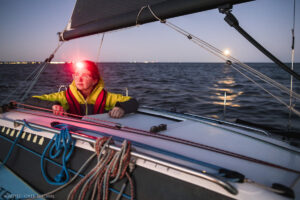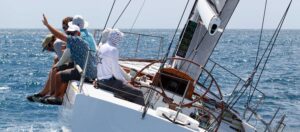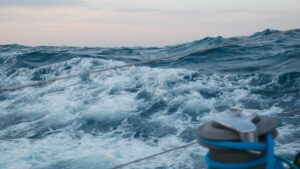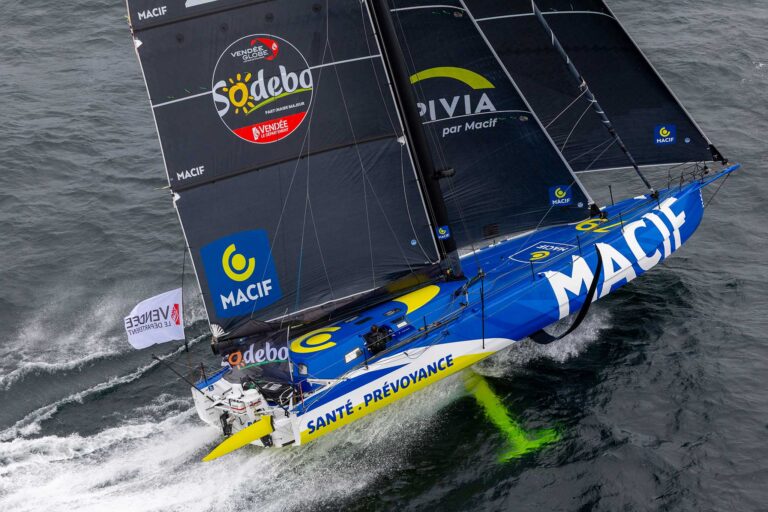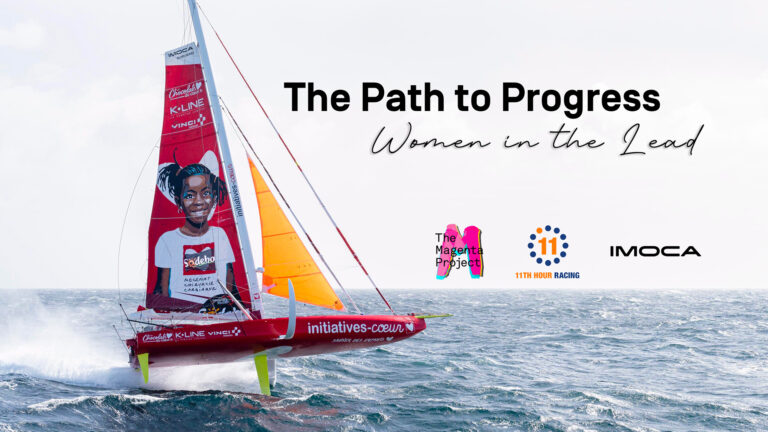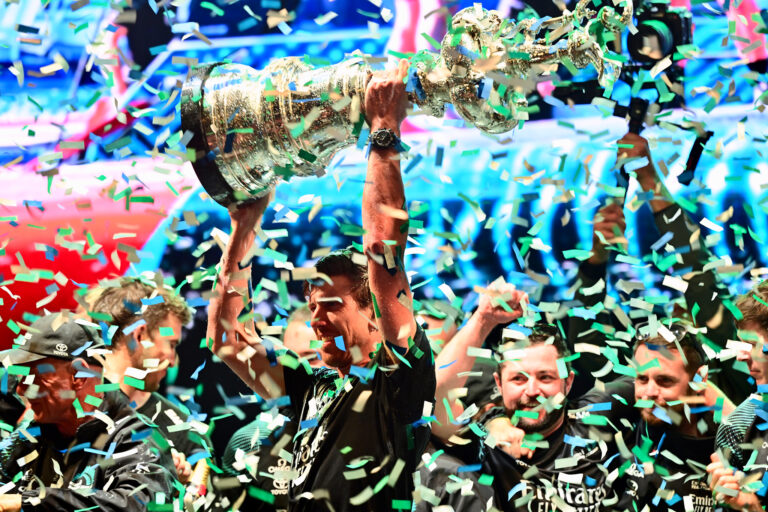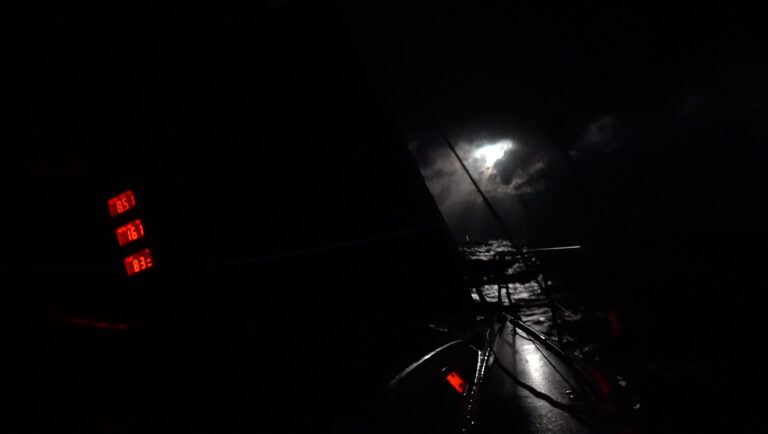It’s break time for the kids enrolled in the Piers Park Sailing Center’s summer youth development program in Boston, Massachusetts. High-pitched squeals reverberate from the dock, where a bucket of recently caught crabs are under serious inspection. Maureen McKinnon-Tucker doesn’t bat an eye as she emerges from the small office and wheels herself down the ramp to Emilio, a college-aged counselor and program graduate himself. After finishes with the introductions, I ask Emilio what it’s like having Maureen as a boss. You can see the gears cranking as he glances from me, holding my notebook and tape recorder, to McKinnon-Tucker, who grins ever so slightly as he talks about how kind she is and what a great experience he’s had here. “You can tell the truth,” McKinnon-Tucker cuts him off. “I’m tough.”
This just may be one of the understatements of the century.
Maureen McKinnon was in college when she met Dan Tucker, an avid sailor. The two began dating, and he eventually introduced her to his parents. “They had this tremendous tension in their marriage,” she says. “And that tension was sailing. He did. She didn’t.” McKinnon-Tucker decided if she wanted to hang on to this fellow, she would have to leave her landlubber life behind. Tucker and his father taught her the basics, but she stuck with “cabana girl” status, even after she married Dan and began racing J/24s, where she was in charge of passing up rum drinks and moving when told to.
Then came a summer day in 1992 when McKinnon-Tucker and Dan were supposed to race off Rockland, Maine. His crew made the start, but hers canceled at the last minute. As she walked her bicycle back toward the ferry landing at low tide, she tripped off a seawall and fell 13 feet to the sand and rocks below. The accident left her paralyzed from the waist down.
McKinnon-Tucker progressed quickly through her rehabilitation program, even taking weekends off from rehab to work in her flower shop. (“I had weddings and bookings and customers!”) But she quickly became frustrated when she tried to get back on a J/24. “It was too physical. I couldn’t sit upright in the boat, and I felt like a burden to the rest of the crew,” she explains. She tried sailing a Freedom 20, the go-to boat for sailors with disabilities, but after years of racing J/24s, it bored her. Like a sailing Goldilocks, she found one too challenging and the other not challenging enough. She resigned herself to kayaking near her home in Marblehead, Massachusetts.
Dan continued to sail, and McKinnon-Tucker continued to accompany him to races, until a chance encounter at a 2001 regatta in Marblehead changed everything.
Like McKinnon-Tucker, Dr. Rick Doerr was wheelchair-bound. Perplexed as to what he was doing there, she wheeled over to ask if his wife was racing. He looked at her indignantly and said he was the one racing—in a Sonar. “Are you a sailor?” he asked. She replied that she was: was, as in, past tense before her accident. “Once a sailor, always a sailor,” he told her. “You just need to get back on the right boat, and that’s a Sonar.” Less than a week later, McKinnon-Tucker was trying out one of the 23-foot sloops with some friends at a Wednesday night beer can race. Next thing she knew, Doerr invited her to be part of his Sonar campaign for the 2004 Paralympics. They finished third at the trials, which was good, but not good enough for a trip to Athens. So McKinnon-Tucker set her sights on Beijing.
Enter Nick Scandone.
While McKinnon-Tucker had been racing up and down the East Coast, Nick Scandone was raking in his own wins out west. A former college All-American at UC Irvine, he barely missed qualifying for the 1992 Barcelona Olympics in the 470 class. In 2002, he was diagnosed with Lou Gehrig’s disease, and though his body began to deteriorate, his sailing did not; in 2005 he was named U.S. Sailing’s Rolex Yachtsman of the Year following a win at the 2.4-Meter World Championship, held off the coast of Italy. Here was a skipper who had what it took to get to the Paralympics. McKinnon-Tucker wanted in.
For the 2008 Paralympics, ISAF announced it would include the double-handed Skud class, in which every boat was required to have a coed crew. No woman had ever won gold in sailing at the Paralympics before. The new rule meant McKinnon-Tucker could have her pick of top male Skud skippers, but like most women, she fell for the guy who showed the least amount of interest. “I called Nick right away, and his reply was, ‘I’m in the 2.4.’”
But as Scandone’s disease continued to ravage his body, it became clear he couldn’t sail in Beijing alone. McKinnon-Tucker got the call Easter morning. “I picked up the phone, and it was Nick, and he said, ‘Join my campaign.’ I said, ‘Fine, but I have to hang up now, because my Easter dinner guests are walking through the door.’” And so it began.
With her skipper a whole continent away, McKinnon-Tucker had to get creative with her training. By 2007, she had two children under the age of 10: Trent (2) and Dana (7). The duties of a full-time mom combined with those of a Paralympics hopeful would have overwhelmed most people, but McKinnon-Tucker decided to add a full-time job to the list and accepted a position as adaptive director at Piers Park Sailing Center.
She racked up a lot of frequent-flyer miles. “I’d leave Wednesday night for California, train with Nick on Thursday, Friday, Saturday and half of Sunday, then catch the red-eye back to Boston in time to go to PPSC for work Monday morning.”
Life was busy, but life was good. McKinnon-Tucker was part of a promising Skud campaign with a top-notch skipper, and she had two great kids and a husband to help out. But her comeback story was about to hit some serious roadblocks.
McKinnon-Tucker was sipping coffee in Florida, where she and Nick were training prior to the Rolex Miami OCR, when she got a call from her mother in Boston. Her son Trent was being airlifted to the hospital. There was fluid in his brain and a chaplain had been called. A doctor got on the phone: “Maureen, I’m not sure if he’ll be alive by the time you get here.”
Trent pulled through, but the prognosis was bleak: cancer. Scandone gave McKinnon-Tucker a green light to abandon the Beijing campaign to be with Trent, but she refused. “Nick’s disease was to the point where this was his only shot,” she says. “If I bowed out, he was done. I couldn’t do that.”
They nailed first place at the U.S. Paralympics Team Trials in Newport, and in 2008 it was off to Beijing. McKinnon-Tucker and Scandone pulled it off and secured their gold medal, defying Scandone’s now rapidly declining health and McKinnon-Tucker’s fears for Trent.
The pictures from that day show a skipper and his crew with arms raised in triumph. Their wheelchairs were hardly the focal point. The flowers and the medals and the tightly clasped hands took precedence. It was a perfect moment that captured the essence of the human spirit.
Just a few months later Nick passed away. McKinnon-Tucker was prepared for this from the start—there was always the possibility Nick wouldn’t even make it to the games—but the blow still struck hard. “With Nick, you knew it was coming,” says friend and PPSC vice chair Jim Donahue. “You could see him getting worse and worse, but it was still awful.”
McKinnon-Tucker moved past it as best she could, joining Gerry Tiernan of Falmouth, Maine, and Andrew Fisher of Greenwich, Connecticut, in a Sonar campaign for London in 2012. She also connected with a 54-year-old sailor from Massachusetts, Jonathan Evans. The two won the Robbie Pierce Regatta early this past summer, and McKinnon-Tucker began to think she had found her skipper for a 2016 Skud campaign.
But the turmoil in her life started up again. She and Dan separated. Then, on Monday, July 12, McKinnon-Tucker called Evans. They chatted for about an hour about life in general and the 2016 Games in particular. That same night he died following a sudden heart attack.
So you can’t blame McKinnon-Tucker for pausing and tearing up when asked if it’s hard to keep pushing, to stay positive. “Karma keeps smacking me around. And I don’t want to get known as this black-widow crew who clicks with a skipper and then he dies. It’s too melodramatic to be believable.” This may be her Achilles’ heel, Donahue notes: “She’s one of those people who’s never 100 percent certain she’s doing the right thing. Even though she’s working so hard at everything she does, she’s constantly afraid she’s going to make a mistake, or do something wrong.”
Still, she pushes the doubt down and “resets the button,” which for McKinnon-Tucker means throwing herself into the various programs she pioneered at PPSC and campaign training with Fisher and Chris Murphy, who recently replaced Tiernan as jib trimmer on McKinnon’s Sonar team. And she’s still considering sailing in the 2016 games in a Skud. “This (Sonar) Paralympics campaign does not include spinnakers, and I miss my spinnaker!” she says. “I miss my carbon-fiber pole. I miss my carbon-fiber mast. I miss high-performance sport boats!”
In the meantime, she has her kids—her own and her PPSC bunch. Trent has been three years cancer-free as of this summer and is attending kindergarten on schedule. Dana, now 11, still reminisces about Beijing to her sailing friends at the yacht club in Marblehead where she takes lessons. McKinnon-Tucker just shakes her head. “It seems a little—ironic?—that my daughter is there while her mom is running a free sailing program from a public sailing center. But that’s what her friends were doing, so that’s what she wanted to do.”
For a moment, McKinnon-Tucker seems absolutely normal, just another mom rolling her eyes at her preteen daughter’s most recent act of rebellion. Then she’s off down the ramp to the dock to admonish a group of youngsters who tied up for a bathroom break and are now lazing around with seemingly no plans to return to the boat. “You still have another half hour,” McKinnon-Tucker says briskly. “Come on, back down!” They’re back in the boat in seconds. Tough indeed.


